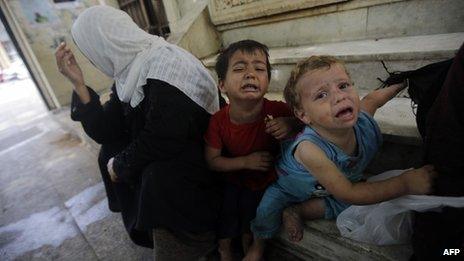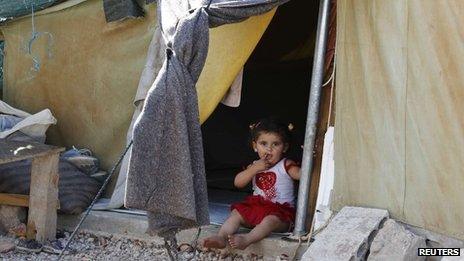Lebanese lives 'in limbo' over Syria
- Published
The loud sigh of relief in some capitals that military action on Syria has shifted to diplomacy has been eclipsed in the region by a more audible sigh over the uncertainty of this war.
"Our lives are on hold," Lebanese political analyst Carol Malouf told me in Beirut. "We are in limbo, sceptical and scared."
The mood in neighbouring countries like Lebanon and Jordan is noticeably calmer than weeks ago when the expectation of an imminent US-led military strike provoked panic-buying of essentials, and anxious planning for escape by those who could afford one.
Now it's the gnawing uncertainty that takes its toll.
Concern for the future
In Lebanon, parents ask if its safe enough for children to go back to school next week. Investors hesitate over whether they can go ahead with costly buildings projects at this time.

More than 750,000 Syrian refugees are now in Lebanon
"As Lebanese who've lived through our own years of war, we can get up in the morning and go to work, but the longer this goes on, the more it affects us," Carol Malouf reflected.
And every day more Syrians cross the borders in desperate search of refuge, including more than 750,000 into Lebanon - which puts this country's fraying social and political fabric under growing strain.
"We used to treat 10 Syrians a day, and now it's a hundred," Chief Medical Officer Dr Gazi Ta'al told me at one of the clinics of the Rafik Hariri Foundation in Beirut which provides subsidised healthcare. "We are now treating fewer Lebanese."
Several doctors and nurses approached us as we left, to ask nervously: "How long do you think this war will go on?"
On the surface, Beirut still seems to be its bustling cosmopolitan self. By day, the main streets are crowded, by night they're sparkling with bright lights.
The Corniche which hugs the Mediterranean is still a magnet for families enjoying an evening stroll, fisherman hoping for a catch and young people looking for fun.
"Look at how some streets are empty, and some shops are closed," remarked a local businessman with a grim glance across one of the city's usually vibrant quarters.
The government is also on hold here, as rival political forces fail to agree on a new cabinet to replace a caretaker team. Every day local newspapers are full of statements and sniping across a political divide that mirrors Syria's political and religious fault lines.
"We were confident we were getting the messaging right," one Western diplomat told me about determined efforts weeks ago to ensure Lebanese politicians did not take steps that could further destabilise this country.
Role of Hezbollah
Lebanon's rival political blocs, known as the March 8th and March 14th coalitions, signed the Baabda Declaration last year. It committed all sides to distance themselves from regional conflicts, including Syria.
But Hezbollah's very public support and military assistance to President Assad's forces is a far more powerful statement in this volatile sectarian mix.
The involvement of the mainly Shia movement in Syria has been loudly condemned by politicians such as former Prime Minister Saad Hariri. His Future Movement is a leading member of the March 14th alliance formed after his father Rafik Hariri was assassinated in 2005.

The need to help Syrian refugees is taking its toll on the Lebanese too
"Syria's war has come to Lebanon, and Lebanon's war has gone to Syria," commented Rami Khouri of the American University of Beirut.
In a region all too used to wars spilling across borders, this current conflict is more fraught and far-reaching.
"It's a proxy war and we take the leftovers," said political analyst Mark Daou. "We take the refugees, we take the bad economic terms, we take the military smuggling, we take the lack of government."
"Our country is falling apart." he warned.
However great the strains, Lebanon still manages to hold together and many here still invoke its legendary resilience. But now even that is being tested in this most uncertain of times.